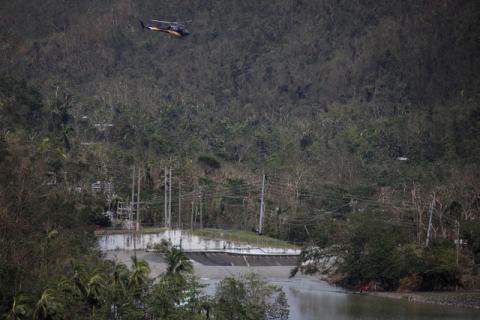Advertisement
Hundreds leave danger zone near crumbling Puerto Rico dam
SAN JUAN (Reuters) - Most people living near a crumbling dam in storm-battered Puerto Rico have been moved to safety, Governor Ricardo Rossello said on Monday, as he urged the U.S. Congress to fund an aid package to avert a humanitarian crisis after Hurricane Maria.
Much of the Caribbean island, a U.S. territory with a population of 3.4 million, is still without electricity five days after Maria struck with ferocious winds and torrential rains, the most powerful hurricane to hit Puerto Rico for nearly a century.
There have been growing concerns for some 70,000 people who live in the river valley below the Guajataca Dam in the island's northwest, where cracks were seen on Friday in the 88-year-old earthen structure.
Rossello said he was working on the assumption that the 120-foot (35-meter) dam would collapse.
"I'd rather be wrong on that front than doing nothing and having that fail and costing people lives," he said in an interview with CNN. "Some of the dam has fallen apart and now we're making sure that we can assess if the other part is going to fall down as well. ... Most of the people in the near vicinity have evacuated."
It was unclear if the governor was saying that most of the 70,000 valley inhabitants had left the area, or only the several hundred people living in the small towns closest to the dam. About 320 people from those towns have moved to safety, according to local media.
The fear of a potentially catastrophic dam break added to the immense task facing disaster relief authorities after Maria, which was the second major hurricane to strike the Caribbean this month. The storm killed at least 29 people in the region.
At least 10 of those who died were in Puerto Rico, including several who drowned or were hit by flying debris, and three elderly sisters killed in a mudslide.
'GAME CHANGER'
Many structures on the island, including hospitals, remain badly damaged and flooded, with clean drinking water hard to find in some areas. Few planes have been able to land or take off from damaged airports.
The National Weather Service warned of further flash floods in some western parts of the island on Monday as thunderstorms moved in.
The hurricane hit at a time when Puerto Rico was already battling an economic crisis.
Rossello said on Monday that before the storms struck, he had been embarking on an aggressive fiscal agenda that included more than $1.5 billion in cuts.
"This is a game changer," he told CNN. "This is a completely different set of circumstances. This needs to be taken into consideration otherwise there will be a humanitarian crisis."
In a statement appealing for support from the U.S. government, Rossello said, "we ask the Trump Administration and U.S. Congress to take swift action to help Puerto Rico rebuild."
In Washington, U.S. House of Representatives Speaker Paul Ryan said Congress was working with President Donald Trump's administration to ensure Puerto Rico was given necessary assistance.
"Our fellow citizens in Puerto Rico remain in our prayers as we make sure they have what they need," he said in a statement.
RELIEF PACKAGE?
House Democratic leader Nancy Pelosi urged the Trump administration to deploy Defense Department resources for rescue operations, law enforcement and transportation in Puerto Rico and the U.S. Virgin Islands.
Congress must also "swiftly" pass a relief package, she said in a statement. Republicans control the White House and both chambers of Congress.
There are more than 10,000 federal staff, including more than 700 people from the Federal Emergency Management Agency (FEMA), doing recovery work in Puerto Rico and the U.S. Virgin Islands, according to FEMA.
No mail is being collected or delivered in Puerto Rico, the U.S. Postal Service said on Monday, adding post offices would reopen once it was safe to do so.
Maria continued to weaken and would likely be downgraded from a hurricane to a tropical storm by Tuesday night, the National Hurricane Center said. As of 2 p.m. ET (1800 GMT) on Monday, it was about 300 miles (480 km) south-southeast of Cape Hatteras, North Carolina, heading slowly north, the center said.
The storm was unlikely to hit the continental United States directly, but the NHC said large swells were affecting the U.S. East Coast. A tropical storm warning was in effect for much of the North Carolina coast and officials issued a mandatory evacuation order for visitors to Ocracoke Island in the Outer Banks, beginning at 5 a.m. ET (0900 GMT) on Monday.
(Reporting by Dave Graham and Robin Respaut; Additional reporting by Jonathan Allen, Scott DiSavino and Peter Szekely in New York and Doina Chiacu in Washington; Editing by Daniel Wallis, Bernadette Baum and Frances Kerry)



















Add new comment